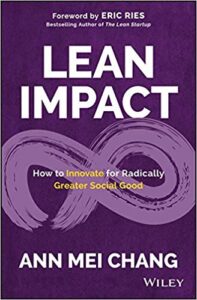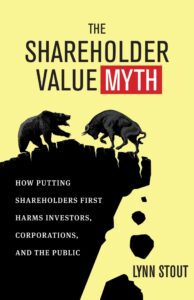Go Beyond Greenwashing. 33 Must-Reads to Understand Corporate Social Impact
January 22, 2020 | By Sheila Herrling and Audrey Voorhees
We are at an inflection point where the stakes are high to reimagine how capitalism and democracy work for everyone. Critical to that reimagination is a movement to evolve the thinking around the role of corporations in driving social impact at the scale that today’s challenges require. Milton Friedman’s notion that the only social responsibility of business is to maximize profit is increasingly being questioned by many, including investors, philanthropists, business leaders, policymakers, and perhaps most notably Millennials, who will represent the future workforce and consumers. People want to buy from, work for, invest in, and donate to companies that identify as social enterprises. Corporate CEOs stand poised to seize the greatest opportunity of their lifetime to deliver both greater financial returns and social returns at scale that could, quite literally, make the world a better, more equitable place.
That said, it’s complicated terrain. Accelerating the movement requires proof points of companies pursuing and achieving financial and social gains, how-to’s for those who are convinced of the value but don’t know where to start, and a solid understanding and appreciation of the counter-arguments.
As we set out to better understand the ideas, actors, flashpoints, and gaps in the corporate social impact (CSI) movement, we learned and built upon the work of others. You can see our full landscape analysis presentation here. As part of our work, we also pulled together what we feel is a “Must Read List” for anyone interested in the role corporates are and could be playing in driving social impact at scale and ensuring that capitalism works for all. We’ve done our best to share a diverse list of authors and viewpoints.
First, get situated in the early, foundational work; corporate social impact is not a new idea.
- The Social Responsibility of Business Milton Friedman, NY Times
- Creating Shared Value Michael Porter & Mark Kramer, HBR (video also)
- Driving Corporate Growth through Social Impact John Mennel & Nate Wong, Deloitte
Second, make sure you understand all sides of the argument; you can’t advance a movement without knowing and truly appreciating all views.
On the pro side, we found these particularly interesting with…
…Compelling arguments
- The Type of Purpose That Makes Companies More Profitable, by George Serafiem and Claudine Gartenberg, HBR.
- Business as Usual Will Not Save The Planet by Mark Kramer, Rishi Agarwal, Aditi Srinivas, HBR
- Profits Because of Purpose by Andrew Beebe, Medium
- The Business Case for More Diversity by Dieter Hogler, WSJ
- New Business Trend: An Authentic Commitment To Purpose by Jay Coen Gilbert, Forbes
- The Purpose Movement Goes to School by Korn Ferry
…Key moments and decisions that served as flashpoints accelerating the movement
- BlackRock Chairman’s Letter to Shareholders by Larry Fink – BlackRock 2018 Annual Report
- Business Roundtable Redefines Mission Statement, by BRT
- Imperative 21 Launch Video by Imperative 21
…A great new media series
- The Company of the Future: Profit and Purpose – Financial Times Series
…And many framed within the broader movement to reimagine Capitalism
- New Capitalism by Marc Benioff – NY Times
- Do You Feel the Ground Shifting? Five Indicators That the Era of Capitalism 2.0 May Be Closer Than You Think by Jean Case, Forbes
- Making Stakeholder Capitalism a Reality, by Laura Tyson and Lenny Mendonca, Project Syndicate
On the counter-argument side, our thinking was informed by:
- Council of Institutional Investors Responds to BRT Statement on Corporate Purpose, by CII.
- Where ESG Fails by Michael E. Porter, George Serafeim, & Mark Kramer, Institutional Investor*
- Corporate Happy Talk and the Duty of Shareholder Loyalty by Walter Olson, Cato Institute
- Corporate Value – Signaling Can Be Bad for Business by James Roberts, Heritage Foundation
Third, understand the landscape of actors and activities that can drive the movement forward.
Once the foundational arguments were absorbed, we began to create the landscape of actors and plot them across a grouping of activities and historical flashpoints that were driving the movement forward. You can view that landscape analysis here. [link to the blog]. Among the gaps standing in the way of mainstreaming the movement, two seemed ripe to solve for in the near-term: how-to content for the already convinced, and the need for a uniform, involuntary impact measurement standard.
For those companies convinced of the need to embed social impact into their operations, there’s not a lot of public content out there. Here’s some we found useful and we hope to see more.
- The Truth About CSR, by V. Kasturi Rangan, LIsa Chase, Sohel Karim – HBR
- Calling All Corporates: You Need to Make “Plan B” Your “A Game” by Sheila Herrling, Beeck Center
- It’s Time for Corporates to Imbed Social Purpose in Their Business Strategy by Greg Hills, FSG
- How Corporate Foundations and CSR Initiatives Are Being the Change by Andria Seneviratne and Nikhil Bumb, FSG
- The Purpose Driven Professional by William D. Eggers, Katie Cooper, Nate Wong, Deloitte
- Social Purpose and Value Creation: The Business Returns of Social Impact, by Kurt Dassel and Xi Wang, Deloitte
We are convinced that the movement will continue to stall without agreement on a uniform, involuntary impact measurement standard; here’s food for thought.
- How the B Impact Assessment and SDG Action Manager Can Help Businesses Plan and Measure Progress by B Lab
- The 2020 Rankings of America’s Most JUST Companies by JUST Capital
- Infighting Undermines ESG Standardization Push, by FT Moral Money
That’s our must list; for those wanting a deeper dive, here are some of the books on the topic that influenced our work. Dig in!
- Green Giants: How Smart Companies Turn Sustainability into Billion-Dollar Businesses by E. Freya Williams
- Lean Impact by Ann Mei Chang
- Trailblazer: The Power of Business as the Greatest Platform for Change by Marc Benioff
- Shareholder Value Myth: How Putting Investors First Harms Investors, Corporations, and the Public by Lynn Stout
Stay connected to the Beeck Center
Sign up for our newsletter and get regular updates on what’s happening at the Center, news about our portfolio interests, social impact job opportunities and more!
Cover Photo by Nong Vang on Unsplash



